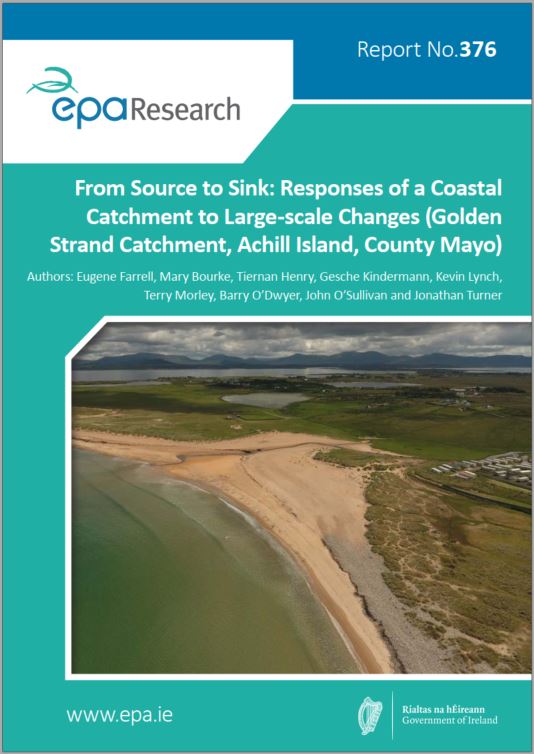Research 376: From Source to Sink: Responses of a Coastal Catchment to Large-scale Changes (Golden Strand Catchment, Achill Island, County Mayo)
Authors: Eugene Farrell, Mary Bourke, Tiernan Henry, Gesche Kindermann, Kevin Lynch, Terry Morley, Barry O’Dwyer, John O’Sullivan and Jonathan Turner
Summary: This research is a series of field experiments that measured patterns in the sediment and water pathways in the Golden Strand catchment, Achill Island, County Mayo. The results show that climate changes (storminess, temperature, precipitation) impacts are site specific and require long-term, multi-disciplinary field monitoring programmes (geomorphology; ecology; hydrology) to capture local specificity and environmental variability.

Identifying Pressures
One of the key challenges facing Ireland in the coming decades is the need to increase our resilience to extreme weather events that are impacting, in many cases in devastating ways, our natural and built environments. Concurrently, humaninduced pressures such as grazing, poor farming practices, recreation, urbanisation, sand and gravel mining, pollution, invasive species and erosion are impacting critical ecosystem services (e.g. regulation of flooding and erosion). A fundamental scientific requirement to build landscape resilience is having extensive regional monitoring programmes that measure the forcing and system response (via states, triggers, thresholds and feedback mechanisms). Field studies tracing the movement of sediment between sources (catchment) and sinks (offshore) are important to identify transport pathways and predict regional and localised seabed mobility to changing ocean climates. This research project fills a knowledge gap by implementing a set of integrated, cross-disciplinary field experiments to measure patterns in the sediment and water pathways in Golden Strand catchment, Achill Island, County Mayo. The results highlight (1) the variability in behaviour of different earth systems within catchments and (2) the urgent need to conduct long-term field-based monitoring programmes.
Informing Policy
Climate action to “build capacity” and “increase climate resilience” is now implemented in Irish policy via the Climate Action Plan 2019 and the National Adaptation Framework. The challenge for coastal communities, scientists and managers is to design adaptation measures that are attainable and sustainable so that they can work together to protect and conserve ecosystems and the goods and services they provide (erosion and flood control, habitat, water, amenities, etc.). The results from this study illustrate that (1) many parts of our coastline are attuned to high-energy wave conditions and require extreme storms to cause significant change; (2) existing agricultural practices along coasts are unsustainable and adversely impacting ecosystems; and (3) peatland-dominated catchments have unique hydrological characteristics that require monitoring programmes (of at least 10 years) to effectively capture inherent environmental variability. These results are critical to direct local authority sectors to apply climate policy objectives in different types of catchments and mobilise communities to identify solutions for the pressure points so that future opportunities are not lost.
Developing Solutions
The increase in frequency of extreme weather events and sea level rise is now locked in for Ireland on account of human-induced climate changes over the past century. There is an urgent need to build better regional-scale landscape models and forecasting and alert systems. Building large-scale, reduced-complexity models of the evolution of Irish landscapes to changing climates requires accurate and confirmable predictions of local-scale changes in very specific environments. The results from this project highlight the need for substantial investment to support longitudinal (years to decades) and multi-disciplinary (geomorphology, ecology, hydrology, climatology, oceanography) monitoring programmes to build an inventory of case studies. The most efficient way to do this is to install a dense nationwide network of low-cost field sensors to continuously collect data that can provide the necessary input for environmental management and planning decisions. In Ireland the loss and/or degradation of ecosystems needs to be framed within new climate policy and planning guidelines as a loss of an integral element of local and regional natural heritage that is of considerable scientific, conservation and recreational value.
https://www.epa.ie/media/epa-2020/research/epa-funded-research/Report_Cover_376.jpg